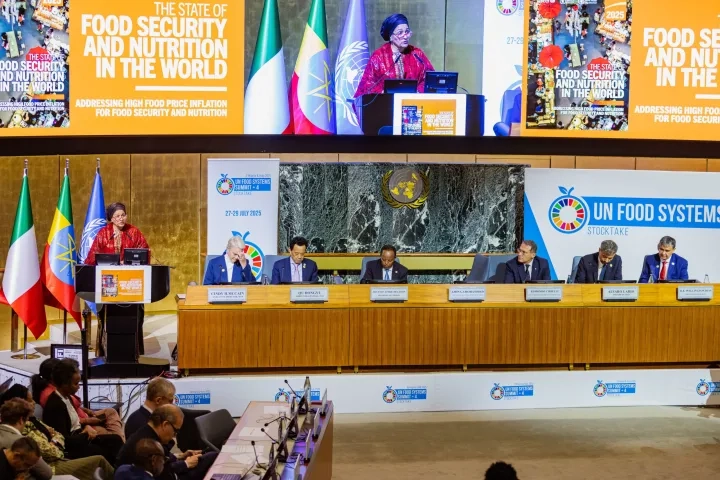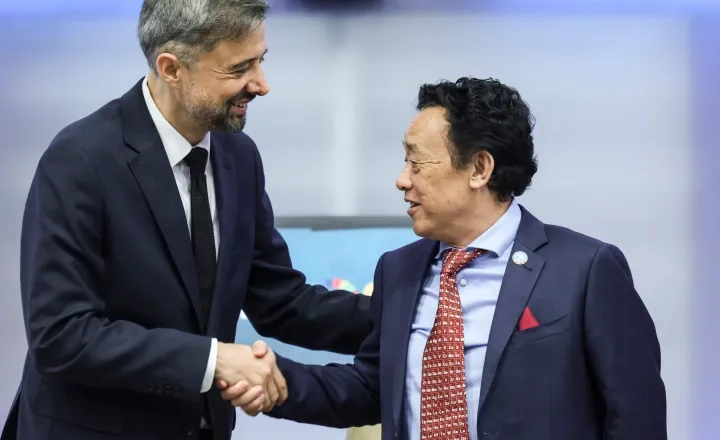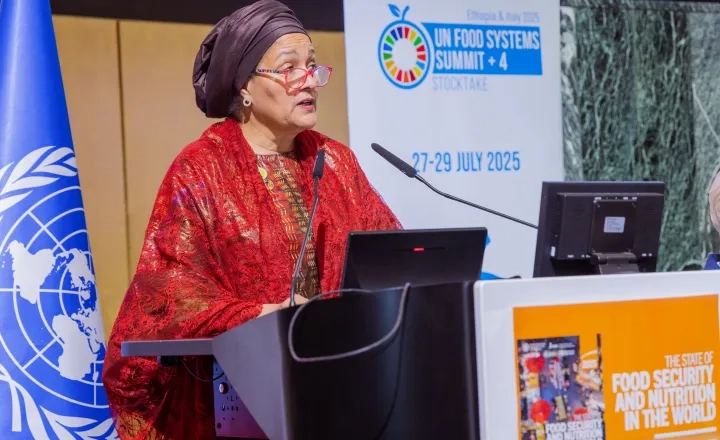In a first for the Global South, Africa hosted the third United Nations Food Systems Summit (UNFSS+4) in Addis Ababa, Ethiopia, from 27 to 29 July. The first of these meetings dedicated to foods critical role in global affairs took place at UN headquarters in New York in 2021, and the second in Rome in 2023. This summit was co-hosted by Ethiopia and Italy, home to the three UN food organisations: the World Food Programme (WFP), the Food and Agriculture Organization (FAO) and the International Fund for Agricultural Development (Ifad).
Another first for this global UN meeting was the appearance of South Africas Minister of Agriculture John Steenhuisen, along with three delegates from his department, reaffirming South Africas commitment to food sovereignty as a pillar of national resilience and development.
advertisement
Don't want to see this? Remove adsOpening the summit, Ethiopian Prime Minister Abiy Ahmed highlighted the immense pressure food systems everywhere are facing as a result of climate shocks, conflicts, inequalities and economic disruptions, along with dramatic declines in development assistance from wealthier countries to developing countries.

United Nations deputy secretary-general Amina Mohammed launched the Food Systems Transformation Accelerator, saying: Food systems are the thread that tie together our goals for health, prosperity and climate resilience. (Photo: FAO / Abate Damte)
The co-host and often controversial Italian Prime Minister Giorgia Meloni appealed to the sensibilities of the majority at the conference, recognising the centrality of food to countries development: We would be making a serious mistake if we limited ourselves to looking at food systems through the face of poverty, suffering and hunger. Food systems are an engine of growth and development.
UNFSS+4s intent was to assess progress since UNFSS+2 in Rome in 2023, and the first UNFSS in 2021. The summit also aimed to strengthen collaboration and unlock finance and investments to accelerate food systems transformation.
advertisement
Don't want to see this? Remove adsSouth Africa takes a stance on accelerating food systems transition
In his address to a high-level panel session on Anticipating the Future of Food: Science, Knowledge and Innovation for Just Transformations, Steenhuisen outlined a series of strategic initiatives designed to strengthen local food production and empower communities to define their own food policies. He spoke about promoting localised food production, with a clear focus on leveraging indigenous crops and livestock, which have both nutritional and climate resilience advantages.
His remarks focused on South Africas support of smallholder farmers, encouraging farmers to embrace regenerative agriculture, investing in research to identify underused plants and their agro-processing potential for products that will facilitate the upscaling and uptake of these foods for nutrition security, as well as on cooperation at a policy and global level in addressing food price inflation and its impact on low-income households.
Steenhuisen did not, however, refer to South Africas enduring national hunger crisis (roughly 17.5% of households are severely food insecure, equating to about 20% of individuals), child stunting figures (29%) due to malnutrition, nor the fact that the country already does produce more than enough food, at a national level, to feed its population.
advertisement
Don't want to see this? Remove ads
FAO director-general Qu Dongyu and Ifad president Alvaro Lario share a light moment between meetings at UNFSS+4. (Photo: FAO / Alessandra Benedetti)
Neither did the minister discuss measures to reduce food waste (about 10 million tonnes of edible food one-third of all food produced in South Africa is wasted every year), nor that household-level food insecurity in South Africa is underpinned by poverty, unemployment and inequality rather than a lack of availability of nutritious food. (However, projections from Stellenbosch University do forecast up to a 50% decline in South Africas agricultural production by 2050 as a result of the impacts of climate change.)
advertisement
Don't want to see this? Remove adsHighlights of UNFSS+4
Ministerial-level discussions dominated the meetings agenda , while UN agency leadership also featured prominently, warning of food systems collapse causing rising instability around the world (WFP executive director Cindy McCain) while reassuring that some food systems transformation is already under way (FAO director-general Qu Dongyu), using three critical levers: the inclusion of young people in creating change, science and innovation, and rapid scaling up of investment.
advertisement
Don't want to see this? Remove adsOn investment, the World Banks global director of agriculture and food, Shobha Shetty, said the bank is shifting its approach from financing one-off projects towards more holistic food systems preparedness plans in 26 countries. (The summit featured several food systems finance-related panels, investment dialogues and country-led investment sessions, getting practical about how financing institutions can help countries shape tailored financing strategies and introduce climate-smart financing mechanisms.)
UN deputy secretary-general Amina Mohammed launched the Food Systems Transformation Accelerator , a joint effort led by the Geneva-based Global Alliance for Improved Nutrition along with FAO and the UN Food Systems Coordination Hub. In her remarks at the launch, she said: Food systems are the thread that tie together our goals for health, prosperity and climate resilience, and 2030 is just around the corner. Political will is strong in many places. But implementation is still being held back by slow-moving finance, fragmented partnerships and the sheer complexity of translating ambition into investible action.
advertisement
Don't want to see this? Remove adsThe accelerator, Mohammed explained, offers a practical response to what countries have asked for again and again: support to turn food systems strategies into real, financed and scalable change. This is about moving money, fast, to the right people. It means financing that aligns with national development priorities. Financing that reaches smallholder farmers, youth, women-led businesses and underserved communities.
advertisement
Don't want to see this? Remove ads
UN deputy secretary-general at the summit. (Photo: Lars Gruenig / FAO)
Mohammed emphasised tapping into existing mechanisms and structures to make sure this accelerator isnt just a concept but a tool delivering real results on the ground, and that deep cooperation across public, private and financial sectors is needed for it to succeed.
Also at UNFSS+4, FAO chief economist M�ximo Torero launched the UNs annual State of Food Security report 2025, declaring a drop in global hunger numbers for the third year in a row by 15 million to 673 million people, or about 8.2% of the global population. The report, which is jointly produced by FAO, WFP, IFAD, the World Health Organization and Unicef, highlights the global impact of a dramatic increase in food prices driven by a combination of unprecedented global shocks.
Despite an overall drop in the number of hungry people, it will come as no surprise to people living in South Africa that hunger is rising in Africa and western Asia, with food imports dependence and currency appreciation [making] food even less affordable, Torero said. South America and South Asia take credit for much of the global improvement, thanks to government social protection programmes, including school meals, cash transfers and investments in agriculture.
The loss of a global food systems champion
The summit took place in the context of the sudden death of a titan of global health and food systems, Sir David Nabarro, who had been planning to attend the meeting. Nabarro (75) was a physician, a UK development assistant and an NGO veteran who was appointed by the UN to global leadership roles to coordinate the UNs responses to the global avian flu pandemic, the worlds largest Ebola outbreak and the Covid-19 pandemic. After serving as special envoy of the World Health Organizations director-general on Covid-19, Nabarro helped create the Scaling Up Nutrition movement, and most recently the 4SD Foundation , which helps leaders in development and business take a systems approach to their organisations.
Transforming food and agriculture through a systems approach
Just days before the summit, on 22 July 2025, the FAO published Transforming food and agriculture through a systems approach . The publication, writes Corinna Hawkes, director of the FAOs Agrifood Systems and Food Safety division, identifies six core elements that form the concrete framework for joined-up action, essentially giving countries a blueprint for transformative change in their food systems. They are systems thinking, systems knowledge, systems governance, integrating actions through systems doing, securing systems investment, and systems learning.

South African journalist Redi Tlhabi moderated a panel on the private sectors role in food systems at UNFSS+4. (Photo: Giulio Napolitano / FAO)
These elements work together to move beyond fragmentation and tackle the underlying causes of complex problems, Hawkes wrote in the FAOs blog . Right now, many solutions exist within our agrifood systems, but these efforts do not always connect and sometimes even compete with each other. We have the technology to feed everyone, yet hundreds of millions of people go hungry every day. We have the knowledge to protect our environment, yet agrifood systems are still the cause of significant environmental damage.
The problem was not that we lacked solutions, but that our solutions are working in isolation from each other.
Using a systems approach as the engine of transformation is our best hope for connecting these solutions and solving the interconnected challenges of reducing malnutrition, environmental crises and inequitable economic development. DM
Ad�le Sulcas writes about food systems, health and the climate and is a senior adviser to Daily Mavericks Food Justice project.




